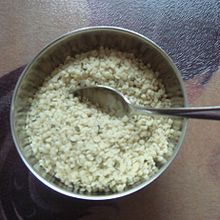
 There will be a lot more coming to the Nutritional Use section. See the Nutrition Menu to the left for your daily dose... and stay healthy!
There will be a lot more coming to the Nutritional Use section. See the Nutrition Menu to the left for your daily dose... and stay healthy!
Hemp seed is...
The most nutritionally complete food source in the world. 2,3,4,5,6,7
Hemp seeds contain all the essential amino acids and essential fatty acids necessary to maintain healthy human life. Hemp seeds provide an adequate source of dietary fiber, calcium and iron, and contains antioxidants and chlorophyll. Whole hempseeds are also a good source of phosphorus, magnesium, zinc, copper and manganese. Hempseed is usually very safe for those unable to tolerate nuts, gluten, lactose, and sugar. In fact, there are no known allergies to hemp foods. Hempseed contains no gluten and therefore would not trigger symptoms of celiac disease."1 The seeds can be eaten raw, ground into a meal, sprouted, made into hemp milk (akin to soy milk), prepared as tea, and used in baking. The fresh leaves can also be eaten in salads. Products include cereals, frozen waffles, hemp tofu, and nut butters, to name a few. A few companies produce value added hemp seed items that include the seed oils, whole hemp grain (which is sterilized by law), dehulled hemp seed (the whole seed without the mineral rich outer shell), hemp flour, hemp cake (a by-product of pressing the seed for oil) and hemp protein powder. Hemp is also used in some organic cereals, for non-dairy milk somewhat similar to soy and nut milks, and for non-dairy hemp "ice cream."
Within the UK, the Department for Environment, Food and Rural Affairs (Defra) has treated hemp as purely a non-food crop. Seed appears on the UK market as a legal food product, and cultivation licences are available for this purpose. In North America, hemp seed food products are sold, typically in health food stores or through mail order. The United States Department of Agriculture estimates that "the market potential for hemp seed as a food ingredient is unknown. However, it probably will remain a small market, like those for sesame and poppy seeds."
Nutrition
Approximately 44% of the weight of hempseed is healthy edible oils, containing about 80% essential fatty acids (EFAs); i.e., linoleic acid, omega-6 (LA, 55%), alpha-linolenic acid, omega-3 (ALA, 22%), in addition to gamma-linolenic acid, omega-6 (GLA, 1–4%) and stearidonic acid, omega-3 (SDA, 0–2%). Protein is the other major component (33%), second only to soy (35%), but more easily digestible because it's primarily globular proteins, 33% albumin and 65% edestin (a Greek word meaning edible). Its amino acid profile is close to "complete" when compared to more common sources of proteins such as meat, milk, eggs and soy. The proportions of linoleic acid and alpha-linolenic acid in one tablespoon (15 ml) per day of hemp oil easily provides human daily requirements for EFAs. Unlike flaxseed oil, hemp oil can be used continuously without developing a deficiency or other imbalance of EFAs. This has been demonstrated in a clinical study, where the daily ingestion of flaxseed oil decreased the endogenous production of GLA.
Hempseed is an adequate source of dietary fiber, calcium and iron, and contains antioxidants and chlorophyll. Whole hempseeds are also a good source of phosphorus, magnesium, zinc, copper and manganese.
Hempseed is usually very safe for those unable to tolerate nuts, gluten, lactose, and sugar. In fact, there are no known allergies to hemp foods. Hempseed contains no gluten and therefore would not trigger symptoms of celiac disease.
Storage
Hemp oil can spontaneously oxidize and turn rancid within a short period of time if not stored properly; it is best stored in a dark glass bottle, in a refrigerator or freezer (its freezing point is –20 °C). Preservatives (antioxidants) are not necessary for high quality oils that are stored properly.
Dietary supplement
Hemp oil has been shown to relieve the symptoms of eczema (atopic dermatitis).
Hemp Seed contains a large dietary supplement of omega-3, higher even than walnuts which contain 6.3% of n-3. 8
References:
-
Hemp, http://en.wikipedia.org/w/index.php?title=Hemp&oldid=414915905 -
HEMP SEED: THE MOST NUTRITIONALLY COMPLETE FOOD SOURCE IN THE WORLD, http://www.ratical.com/renewables/hempseed1.html -
Hemp Seeds Are the Most Complete Food, http://ezinearticles.com/?Hemp-Seeds-Are-the-Most-Complete-Food&id=5883615 -
Hemp Seeds: The Most Nutritionally Complete Food Source In The World!, http://www.bewellbuzz.com/uncategorized/hemp-seeds-the-most-nutritionally-complete-food-source-in-the-world/ -
Hemp: The Most Complete Food For Dieters, http://www.articlesbase.com/nutrition-articles/hemp-the-most-complete-food-for-dieters-3306651.html -
MOST NUTRITIONALLY COMPLETE FOOD..., http://www.wellsphere.com/raw-food-article/most-nutritionally-complete-food/386963 -
Amazing Hempseed, http://nutiva.com/nutrition/amazing-hempseed/ -
Hemp, http://en.wikipedia.org/w/index.php?title=Hemp&oldid=415304409








